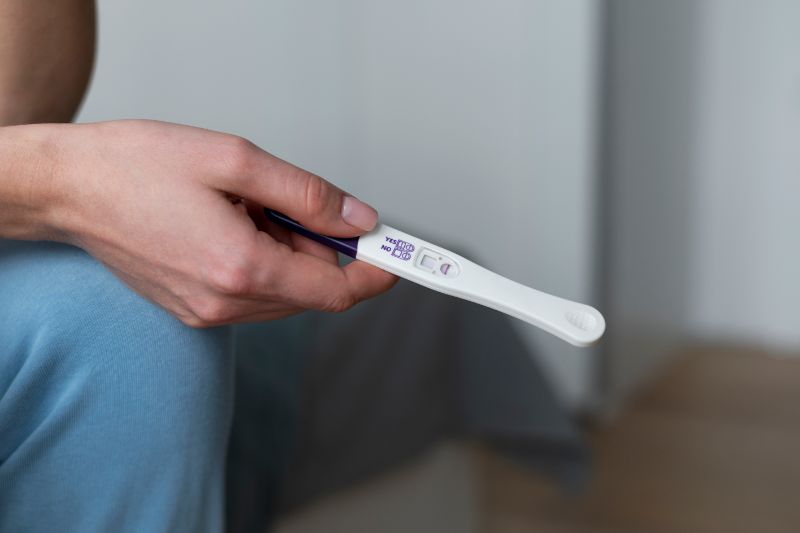
It is estimated that about 13% of couples struggle to conceive even after trying conventional methods. It could be frustrating when all you can do is wonder whether you need to be more patient or if it is infertility.
That is why we at Credence have compiled all the needed information about infertility, its causes, and treatment options for you in this blog. We hope this blog will give you more clarity about your situation while you are struggling to conceive.

What is Infertility? When Should You Consult a Doctor?
Infertility is when a couple is struggling to conceive having unprotected sex for one year, in cases where the female partner is under the age of 35. When the female partner is 35 years old or older, the period for observation for infertility is recommended as six months.
The following are the circumstances under which women should consult a doctor to diagnose infertility:
- When you are 35 or older and have been struggling to conceive for over 6 months.
- When your age is over 40
- When your periods are irregular or painful or if you experience no periods at all
- When you have a history of pelvic inflammatory disease or suffer from endometriosis
- When you have a history of miscarriages.
- When you have undergone chemotherapy, radiation, or other cancer treatments.
Further, these are the circumstances under which men should get checked for infertility:
- When you have problems with sperm or low sperm count
- When you have a history of sexual, testicular, or prostate conditions
- When you have undergone treatment for cancer
- When you had surgery for hernia
- When your testicles are smaller compared to normal adult size.
- When you have swollen veins in scrotum
- When you have experienced infertility while being with a partner in the past
- When one of your relatives had been struggling to conceive in the past
Common Reasons Behind Infertility in Women:
These are the reasons why you should be struggling to conceive as a woman:
- Ovulation issues such as anovulation cause polycystic ovary syndrome (PCOS)
- Endometriosis with endometrial tissue growing outside of the uterus
- Blocked fallopian tubes
- Uterine fibroids block the fallopian tubes or prevent fertilized eggs from attaching to the uterus.
- Aging results in a rapid decline in fertility and an increase in the risk of miscarriages
Common Reasons Behind Infertility in Men
- Medical conditions affecting sperm count and sperm quality
- Premature ejaculation, genetic diseases, blockage in the testicle, or injury to the reproductive organ
- Exposure to pesticides, certain medications, and overheating of testicles
- Treatment for cancer
Lifestyle Factors Worsening Infertility
There are several factors related to the lifestyle of individuals that can worsen or lead to infertility. If you are struggling to conceive, you might want to consider these factors:
- Aging
- Use of alcohol
- Being underweight or overweight
- Performing strenuous exercise
- Chronic stress
- Cigarette smoking
- Eating diets filled with added sugars, trans fats, or saturated fats
- Drug abuse
- High intake of caffeine
- Sexually transmitted diseases (STDs)
- Exposure to toxins in the environment
- Use of some medications
- Sedentary lifestyle
- Chemotherapy or previous exposure to radiation
- Struggling to conceive because of delayed marriage or late conception
Medical Conditions Affecting Fertility
- Fallopian Tube Obstruction:
It is a condition when a damaged or blocked fallopian tube blocks the path of sperm to the egg or the egg to the uterus.
- Irregular Uterine Shape:
Irregular uterine shape can be present in a female child during birth or can develop after birth. This condition can increase the miscarriage risks, lead to pregnancy complications, and make it difficult to get pregnant.
- Ovulation Disorder:
Ovulation disorders are the reason for female infertility in about 25% of cases. These disorders occur when egg production does not happen or is disrupted during a menstrual cycle.
- Male Factor:
Male factor infertility mostly occurs because of abnormal movement or shape of sperm or low sperm count.
Diagnostic Options to Identify Fertility Issues
Several tests can diagnose infertility in a person. Some of these tests that help diagnose the reason why a woman might be struggling to conceive are:
- Ovulation testing to see whether you are ovulating
- Blood test to check Thyroid function because of which you might be struggling to conceive.
- Hysterosalpingography to check for blockages in the fallopian tubes or to analyse the condition of uterus
- Ovarian reserve testing to check the number of egg for ovulation
- Hormone tests to check the levels of pituitary hormones and other hormones
- Imaging tests such as pelvic ultrasound and saline infusion sonogram to observe uterus.
- Hysteroscopy and Laparoscopy are used rarely
Diagnostic tests to find out the reason for infertility in men include:
- Semen analysis
- Blood tests to check the levels of male hormones such as testosterone
- Genetic testing to see whether you are struggling to conceive because of a genetic defect.
- Testicular biopsy to observe a small tissue of testicle
- Imaging procedures such as ultrasound or brain MRI
- Other tests
Infertility-related Emotional Challenges:
Infertility can result in different emotional challenges in a couple struggling to conceive. These challenges can discourage one or both parties from continuing treatment for infertility. Psychological symptoms such as irritability, depression, or anxiety can also occur as a result of the medicines used to treat infertility.
The following are some of the common emotional challenges faced by couples struggling to conceive:
- Low self-esteem
- Depression and anxiety
- Sadness, anger, and frustration
- Loneliness, guilt, and grief
- Social stigma
- Lack of empathy from family and friends
- Psychological distress
- Financial difficulties
Treatment Options: What to Expect on Your Fertility Journey
While taking treatment for infertility, you should talk to your doctor about your symptoms and discuss the pros and cons of all your treatment options. The following are some of the treatment options for couples struggling to conceive:
- Lifestyle changes such as quitting the use of cigarettes, drugs, alcohol, etc.
- Gaining or losing weight.
- Taking fertility drugs
- Intrauterine insemination (IUI) or placing the a sperm right into the uterus
- In vitro fertilization (IVF), which involve fertilizing an egg with sperm to create an embryo in a lab
- Surgery to treat polyps, fibroids, blocked fallopian tubes, or scar tissue
- Donation of egg or sperm
Also read: IVF (In Vitro Fertilization): Step-by-Step IVF Procedure
Reasons to Choose Credence Hospital in Your Journey to Fertility
Credence Hospital is a pioneer in reproductive and infertility treatment in Kerala. With over 20 years in the field, we offer our patients some of the advanced assisted reproductive technologies, such as embryo freezing by vitrification and test tube baby facilities.
We also have to our credit feats such as conception and delivery of the first baby through Testicular Sperm Aspiration (TESA) and Intracytoplasmic Sperm Injection (ICSI) in South Kerala in a lady who is over 40. Credence also takes pride in the birth of the first baby in South Kerala through a frozen embryo. Hence, we can assure you of your physical and emotional well-being in your journey to parenthood.



